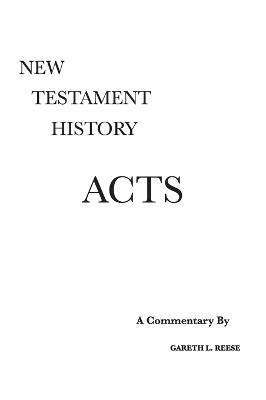Acts: A Critical and Exegetical Commentary

Acts: A Critical and Exegetical Commentary
This is a phrase-by-phrase commentary and exposition of the New Testament book of Acts. This commentary is in use as a college textbook, yet is suitable for lay church members.
Acts is a history book, written by Luke to complement and continue the record begun in his Gospel. In Acts, Luke demonstrates how Jesus' apostles faithfully and obediently put the Great Commission into practice, beginning "in Jerusalem, and then into all Judea and Samaria, and even to the remotest part of the earth" (Acts 1:8). Acts is also indispensable for the introductions it provides to many people encountered elsewhere in the New Testament: Peter, Paul, Barnabas, Silas, Timothy, Luke, Apollos, Priscilla and Aquila, etc.
The Restoration Movement consistently treats Acts as history, but also as a type of unbiased How-To manual for the church.
75% of the New Testament books find their historical backdrop in Acts. Knowing when the churches in the Galatian region or in the cities of Ephesus or Thessalonica were planted is important to interpreting the epistles bearing their names. Knowing the circumstances of Paul's life during the time when he penned Romans or 1 Corinthians or Philippians colors our interpretation of those books. Knowing who Peter, Luke, and Timothy were influences our interpretations of numerous Scriptures. Such historical information is found in Acts.If the early church is the pattern and model for us to follow, Acts becomes a How-To manual of sorts. Who can be a Christian, and how does it happen? Who receives spiritual gifts, and how does it happen? What ordinances ought the church observe, and when? What makes a church grow, and how does it happen? What is the relationship between church and state? What is the right response to persecution and tribulation? How ought Christianity interact with other religions? How ought we to battle evil in the spiritual world around us? What is missionary work like, and whom should be sent? What is the right leadership structure in the church, and how are leaders selected? Such questions can be dealt with using the guidance the Holy Spirit provided in Acts.
Since this commentary presumes the God-inspired nature of all Biblical writing, the author harmonizes Acts' teachings with other relevant Scriptures, and frequently examines the original language in which it was written. And because of their importance, multiple Special Studies are provided on many of the How-To topics noted ab
PRP: 465.00 Lei
Acesta este Prețul Recomandat de Producător. Prețul de vânzare al produsului este afișat mai jos.
418.50Lei
418.50Lei
465.00 LeiIndisponibil
Descrierea produsului
This is a phrase-by-phrase commentary and exposition of the New Testament book of Acts. This commentary is in use as a college textbook, yet is suitable for lay church members.
Acts is a history book, written by Luke to complement and continue the record begun in his Gospel. In Acts, Luke demonstrates how Jesus' apostles faithfully and obediently put the Great Commission into practice, beginning "in Jerusalem, and then into all Judea and Samaria, and even to the remotest part of the earth" (Acts 1:8). Acts is also indispensable for the introductions it provides to many people encountered elsewhere in the New Testament: Peter, Paul, Barnabas, Silas, Timothy, Luke, Apollos, Priscilla and Aquila, etc.
The Restoration Movement consistently treats Acts as history, but also as a type of unbiased How-To manual for the church.
75% of the New Testament books find their historical backdrop in Acts. Knowing when the churches in the Galatian region or in the cities of Ephesus or Thessalonica were planted is important to interpreting the epistles bearing their names. Knowing the circumstances of Paul's life during the time when he penned Romans or 1 Corinthians or Philippians colors our interpretation of those books. Knowing who Peter, Luke, and Timothy were influences our interpretations of numerous Scriptures. Such historical information is found in Acts.If the early church is the pattern and model for us to follow, Acts becomes a How-To manual of sorts. Who can be a Christian, and how does it happen? Who receives spiritual gifts, and how does it happen? What ordinances ought the church observe, and when? What makes a church grow, and how does it happen? What is the relationship between church and state? What is the right response to persecution and tribulation? How ought Christianity interact with other religions? How ought we to battle evil in the spiritual world around us? What is missionary work like, and whom should be sent? What is the right leadership structure in the church, and how are leaders selected? Such questions can be dealt with using the guidance the Holy Spirit provided in Acts.
Since this commentary presumes the God-inspired nature of all Biblical writing, the author harmonizes Acts' teachings with other relevant Scriptures, and frequently examines the original language in which it was written. And because of their importance, multiple Special Studies are provided on many of the How-To topics noted ab
Detaliile produsului









